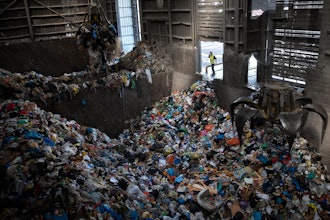WARSAW, Poland (AP) -- Poland is conducting DNA tests on meat samples at seven facilities to see if any are the source of horsemeat discovered this month in Irish-produced burgers, a senior meat safety official said Thursday.
So far, Polish investigators haven't found any evidence to link the country to the horsemeat detected in burgers produced by Ireland's Silvercrest processing plant, said Jaroslaw Naze, the deputy head of Poland's General Veterinary Inspectorate. He said results of the tests on samples from five slaughterhouses, a meat processing plant and a cold storage unit are expected early next week.
Irish food and agriculture officials say horsemeat found in burgers produced for British and Irish consumers came from a Polish supplier who sent Silvercrest frozen blocks of slaughterhouse leftovers that were labeled as beef.
"I don't have any signs yet that horsemeat was mixed with beef in Poland," Naze told The Associated Press. "But I am waiting for the final reports."
He refused for now to provide the names of the companies being investigated on the principle that they are innocent until proven guilty. But he said that if any supplier added horsemeat into products labeled as beef or something else, it would be a crime and prosecutions would follow. He said that aside from the DNA testing, inspectors are also studying documentation and working closely with counterparts in Ireland and Britain to determine the source of the horsemeat.
Poland has a large agricultural sector that exports significant quantities of meat and other foods to markets in Europe and beyond. A discovery of meat sold as beef, but contaminated with horsemeat, could tarnish the country's reputation as a source of food.
Naze stressed that even if wrongdoing is uncovered, the problem would be with the labeling of the meat and that there has been no threat to human health.
The Polish tests follow a Food Safety Authority of Ireland announcement Jan. 15 that its DNA testing had found 29 percent horsemeat in one Silvercrest-made burger produced for the British supermarket chain Tesco.
Ireland's Agriculture Department on Saturday announced that further investigations had narrowed the source of this horsemeat to a product imported from a Polish supplier. On Wednesday, a second British supermarket chain said its own DNA testing found a Silvercrest-produced burger containing 17 percent horsemeat.
The scandal has eroded market confidence in burgers supplied by Ireland, where beef is the country's dominant food export. The County Monaghan plant that produced the horse-heavy burgers, Silvercrest, was shut down more than a week ago as a precaution and its two biggest customers — Burger King's European operations and Tesco, the biggest supermarket chain in Britain and Ireland — announced they're taking business elsewhere.
Burger King announced Thursday it had discontinued all business with Silvercrest, which previously supplied the hamburger patties used in all its restaurants in Ireland, Britain and Denmark. Burger King said those outlets now all used meat supplied by plants in Italy and Germany that had recently passed DNA inspections to prove they had no horsemeat in their product.
The latest defector, the Irish division of the German discount grocer Aldi, said Thursday that Silvercrest's unapproved use of Polish meat represented "a serious breach of contract." Silvercrest's only product for Aldi Ireland had been billed as a "100 percent Irish beef burger" endorsed by Ireland's food quality agency.
Associated Press writer Shawn Pogatchnik in Dublin contributed to this report.






















